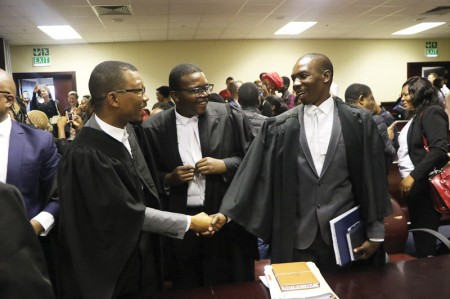State's soft defence was doomed from Day 1
Mbongeni Mguni | Friday June 14, 2019 13:14


And going by what the bench of three judges wrote in their 132-page judgement, the State always had the pummelling coming.
From the time the AG’s response to the case involved calling the 24-year old applicant a “cry baby” who was free to engage in sexual activity as long as it was not “per anus,” defeat was staring the State in the eye.
These types of arguments, or echoes of them, seemed to have worked in the most famous and most cited case involving same sex relations, the 2003 Court of Appeal matter, Kanane vs Attorney General.
Chiefly, the State mounted its defence on the point that decriminalisation would infringe public morality and in that it had had the right to enact laws to protect public morality.
In any case, the State argued, the relevant laws were not discriminatory as amendments made meant both men and women could be in trouble for carnal acts against the order of nature.
It won and the Court of Appeal added that Batswana were not yet ready to embrace homosexuality, both the identity and the associated acts.
Warning signs that these arguments were losing traction in the judiciary for the State were flashed 13 years later in March 2016 when the Court of Appeal ruled against the AG.
The AG had appealed against the registration of LEGABIGO, a gay rights NGO. The State again argued that homosexuality was unlawful, that registering LEGABIBO as a society would be encouraging an organisation to pursue unlawful acts and that the State was trying to fight “social ills”.
In this case, the Court of Appeal (CoA) ruled that homosexuality (as an identity) was in fact not illegal in Botswana and that what was illegal was homosexual conduct.
The CoA also took a very dim view of the State’s argument that it was trying to prevent “social ills.” The CoA, instead, noted that it was difficult to see the “victims” of social ills involving sexual contact between two consenting adults.
The argument of defending public morality was running its course, but the State apparently did not see it because in March, similar sounding defences were being made in the case involving the 24-year old.
“It’s unAfrican,” said advocate Sidney Pilane, presenting the State’s oral arguments in March at the High Court.
“Should those who partake in bestiality also come here and demand for laws to be changed?
“Why can’t homosexuals have sex without violating the law.”
In its written arguments, the State was clear that it was sticking to the beaten track.
“There is a groundswell of support amongst Batswana against homosexuality and Batswana are not yet ready to embrace homosexuality,” the State said, echoing its arguments from the 2003 Kanane case.
Again, the State went back to an old favourite: the law was not discriminatory since both men and women could be charged with carnal acts contrary to the natural order.
In fact, the High Court judges noted that the State had placed significant reliance on the Kanane case to again secure a victory over the gay rights lobby.
“The Kanane decision is the respondent’s buoy and trumpcard,” the judges noted this week.
It was not to be however, as the judges punched holes in the State’s defence. First to be stripped away was the State’s favourite: the public morality defence.
“In my view, criminalising consensual same sex in private, between adults, is not in the public interest,” Justice Michael Leburu said.
“Such criminalisation, it has been shown by evidence, disproportionately impacts on the lives and dignity of Gay, Bisexual and Transgender (LGBT) persons and perpetuates stigma and shame.
“There is no victim within consensual same sex intercourse between adults.
“What compelling State interest is there, necessitating such laws.
“Should private places and bedrooms be manned by sheriffs to police what’s happening there.”
The argument that Batswana were not yet ready for change suffered an equally decisive counter from the bench.
The judges said the passage of time and the passing of amendments to the Employment Act by Parliament, which contain protection of LGBTs shows that the country’s attitude has changed.
“With the greatest of respect and deference (to the Court of Appeal’s ruling in Kanane), I say time has come that private same sexual intimacy between adults must be decriminalised, as it is hereby proclaimed,” Leburu said.
The State was on the canvas, but an appeal can be filed within six weeks, a possibility judging by the AG’s dogged pursuit in the LEGABIBO registration matter.
Thus far, however, the State is still tending to its wounds.
